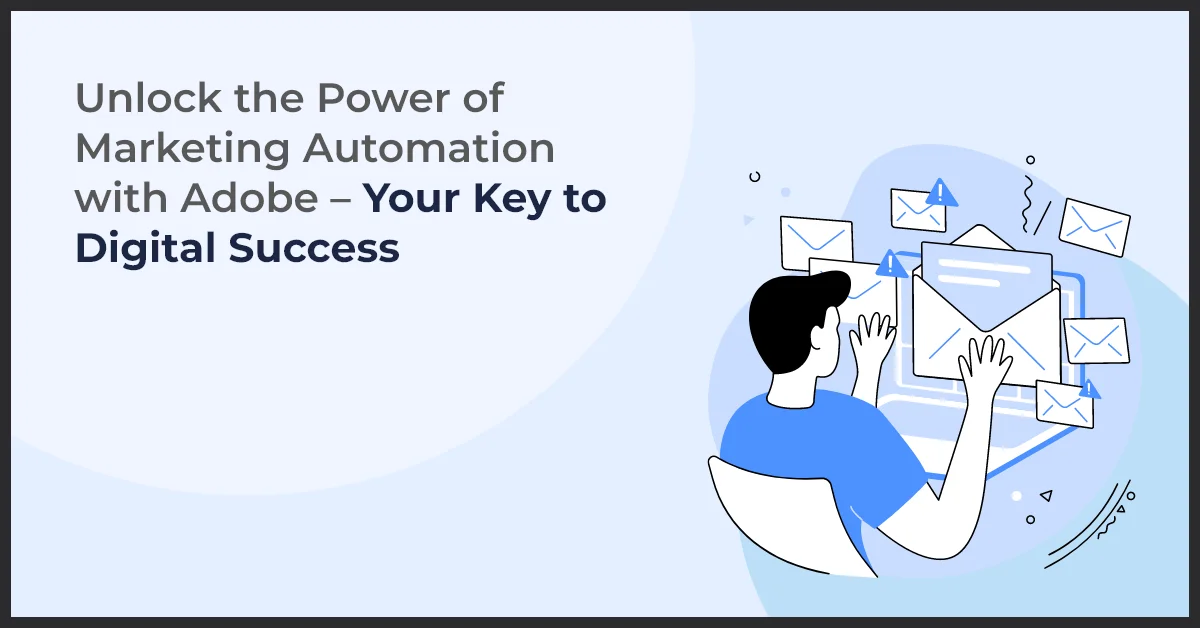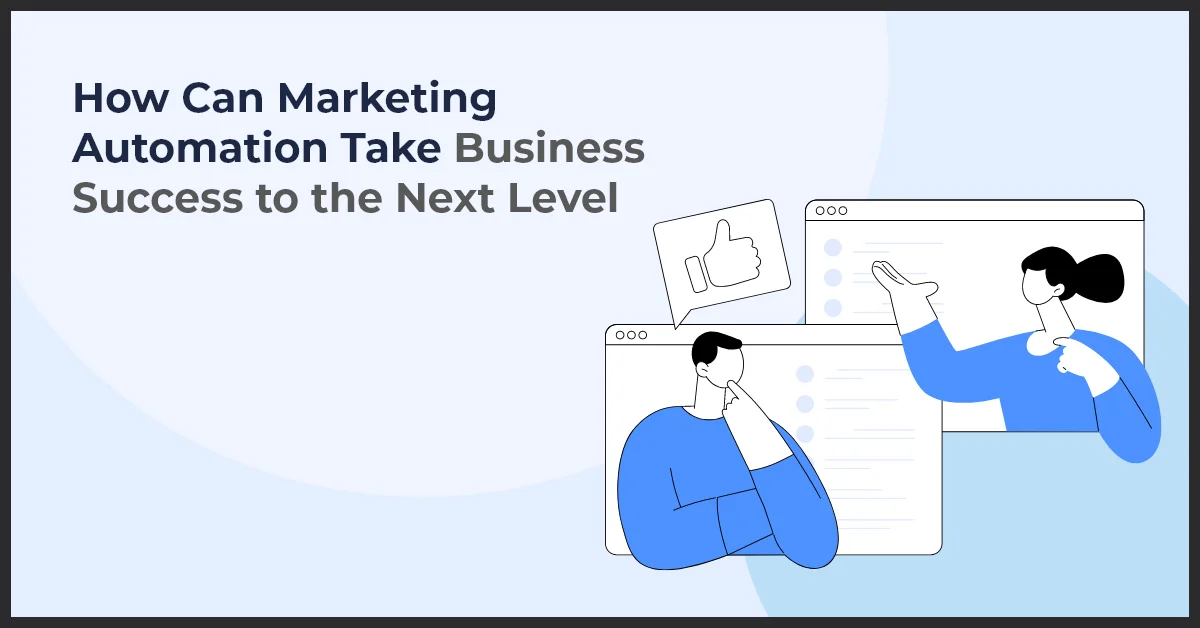Unlock the Power of Marketing Automation with Adobe – Your Key to Digital Success

Published on: October 28, 2023
Updated on: July 02, 2024
639 Views
- Marketing Automation
14 min read
Marketing automation has revolutionized the way businesses connect with their audience, streamline operations, and drive revenue. In the digital era, where customer expectations are skyrocketing, it has become imperative for brands to adopt robust marketing automation strategies.
Adobe, a renowned leader in the industry, offers cutting-edge marketing automation solutions that empower businesses to optimize their marketing efforts and enhance customer experiences. Through a seamless integration of analytics, data management, and personalized campaigns, Adobe proves to be the ultimate catalyst for businesses aiming to stay ahead of the game.
Marketing automation is a powerful tool that allows businesses to streamline their marketing efforts and automate repetitive tasks, such as email campaigns, social media scheduling, and lead nurturing. It enables companies to target their audience with personalized and relevant content, while also providing valuable insights and analytics for optimizing marketing strategies.
A. Benefits of implementing marketing automation in a business
- Increased efficiency and productivity: Marketing automation eliminates the need for manual and time-consuming tasks, enabling your team to focus on more strategic initiatives.
- Improved lead generation and nurturing: By delivering personalized and timely content to your leads, marketing automation helps nurture them through the buyer's journey, increasing the chances of conversion.
- Enhanced customer experience: With marketing automation, you can send targeted messages based on customer behavior, preferences, and demographics, providing a more customized and relevant experience.
- Better alignment between marketing and sales: Marketing automation tools facilitate seamless collaboration between marketing and sales teams by providing valuable data and insights on lead quality and behavior.
B. Key features and functionalities of marketing automation tools
- Email marketing automation: Create, schedule, and send personalized email campaigns to engage with your audience at different stages of the customer lifecycle.
- Lead scoring and nurturing: Assign scores to leads based on their interactions and behaviors, and automate follow-up actions to move them through the sales funnel.
- Social media management: Schedule and publish posts on various social media platforms, track engagement, and analyze performance.
- Landing page and form builders: Design and optimize landing pages and forms to capture lead information and track conversions.
- Analytics and reporting: Track and measure the effectiveness of your campaigns, gain actionable insights, and monitor key performance indicators.
By leveraging these features, marketing automation tools empower businesses to effectively automate their marketing processes and achieve their goals.
Adobe Marketing Cloud: The All-In-One Solution
Looking for a comprehensive marketing platform that can streamline your marketing automation efforts? Look no further than Adobe Marketing Cloud. Packed with powerful features and capabilities, Adobe Marketing Cloud is designed to be the all-in-one solution for your marketing automation needs.
A. Introduction to Adobe Marketing Cloud as a comprehensive marketing platform
Adobe Marketing Cloud is more than just a marketing automation tool – it's a comprehensive platform that includes a wide range of marketing capabilities. From analytics and personalization to campaign management and customer insights, Adobe Marketing Cloud has it all.
B. Overview of Adobe's marketing automation capabilities within the platform
Adobe Marketing Cloud offers robust marketing automation capabilities to help you streamline your marketing processes. With features like automated email campaigns, lead scoring, and lead nurturing, you can automate repetitive tasks and focus on engaging with your customers.
C. Key features and benefits of using Adobe Marketing Cloud for marketing automation
When it comes to marketing automation, Adobe Marketing Cloud stands out from the crowd. Some key features and benefits include:
- Powerful segmentation capabilities to target your audience accurately
- Automated workflows to streamline your marketing processes
- Advanced analytics and reporting for data-driven decisions
- Integration with other Adobe tools for a seamless marketing experience
- Personalization options to create tailored experiences for your customers
With Adobe Marketing Cloud, you can optimize your marketing efforts and deliver exceptional experiences to your customers.
Leveraging Marketing Automation in Campaign Management
Marketing automation has revolutionized the way businesses plan and execute their marketing campaigns. With Adobe Marketing Cloud, this process becomes even more efficient and streamlined. Here are some ways in which marketing automation enhances campaign management:
A. How marketing automation enhances campaign planning and execution
By utilizing marketing automation tools provided by Adobe, marketing teams can streamline their campaign planning and execution process. These tools help in automated lead capturing, segmentation, and nurturing, ensuring that the right message reaches the right audience at the right time.
B. Key components of a successful marketing campaign utilizing automation
A successful marketing campaign utilizing marketing automation comprises key components such as personalized content creation, dynamic email marketing, behavior tracking, and lead scoring. Adobe Marketing Cloud offers all these components and more to create impactful campaigns.
C. Examples of successful marketing campaigns implemented through Adobe Marketing Cloud
Adobe Marketing Cloud has been instrumental in the success of numerous marketing campaigns. From personalized email campaigns that resulted in higher open and click-through rates to targeted social media campaigns that generated increased engagement, Adobe has proven to be a game-changer in campaign management.
The Power of Personalization with Marketing Automation
Personalization in marketing is the key to effectively engaging with your customers and building meaningful relationships. By tailoring your messages and content to meet your audience's specific needs, you can capture their attention and inspire action. With marketing automation, this process becomes even more powerful.
Marketing automation enables personalized marketing efforts by leveraging customer data and behavior. Through sophisticated algorithms and machine learning, Adobe Marketing Cloud empowers marketers to create highly targeted campaigns that resonate with each individual recipient.
Implementing effective personalization strategies using Adobe Marketing Cloud involves the following:
- Segmentation: Dividing your audience into specific segments based on various criteria such as demographics, geographic location, or purchasing behavior. This allows you to tailor your messages to each group's unique preferences and interests.
- Behavioral Tracking: Monitoring and analyzing your customers' online behavior to gain insights into their preferences and intent. By understanding their actions, you can deliver personalized content at the right time and in the right context.
- Dynamic Content: Creating dynamic content that adapts to each individual recipient based on their profile and behavior. This ensures that your messages are highly relevant, increasing engagement and conversion rates.
- A/B Testing: Experimenting with different variations of your marketing campaigns to identify the most effective strategies. With Adobe Marketing Cloud's A/B testing capabilities, you can continuously optimize your personalization efforts.
By harnessing the power of personalization with marketing automation, you can transform your customer engagement and drive exceptional results. With Adobe Marketing Cloud's comprehensive suite of tools and features, you have everything you need to deliver highly personalized experiences that resonate with your audience.
Data and Customer Insights in Marketing Automation
Effective marketing automation relies on accurate and valuable data. By collecting, analyzing, and leveraging data, marketers can gain valuable insights into customer behavior and preferences, resulting in more personalized and targeted campaigns.
Role of Data in marketing automation and its Impact on decision-making
Data plays a crucial role in marketing automation. It provides marketers with valuable information about customers, such as demographics, purchasing behaviors, interests, and preferences. With this data, marketers can create more targeted and relevant campaigns, leading to improved customer engagement and conversion rates.
Furthermore, data analysis allows marketers to make informed decisions based on valuable insights. By tracking and measuring key metrics, marketers can identify what is working and what needs improvement in their marketing strategies. This data-driven decision-making approach helps optimize campaigns, maximize ROI, and drive business growth.
Leveraging customer insights through marketing automation platforms
Marketing automation platforms, like Adobe Marketing Cloud, offer powerful tools for collecting and analyzing customer data. These platforms track customer interactions across various touchpoints, including email, social media, website visits, and more. By centralizing customer data, marketers can gain a holistic view of each customer's journey and tailor their marketing efforts accordingly.
Through segmentation and personalization features, marketers can leverage customer insights to deliver highly targeted and personalized messages. For example, based on past purchase behaviors, marketers can send relevant product recommendations or exclusive offers to specific customer segments. This level of personalization enhances the customer experience, strengthens brand loyalty, and drives conversions.
Enterprise-Level Marketing Automation with Adobe
Marketing automation has become an essential tool in today's digital landscape. As businesses strive to streamline their marketing efforts and deliver personalized experiences, enterprise-level solutions are becoming increasingly important. Adobe, a pioneer in the digital marketing space, offers a comprehensive suite of enterprise marketing automation solutions.
Overview of Adobe's enterprise marketing automation solutions
Adobe understands the unique challenges faced by large organizations when it comes to marketing automation. Their suite of solutions is specifically designed to address these challenges head-on.
- Adobe Campaign: A powerful platform that allows enterprises to create, automate, and manage personalized campaigns across multiple channels.
- Adobe Target: Leveraging advanced machine learning algorithms, this solution enables businesses to deliver personalized experiences to individual customers in real-time.
- Adobe Experience Manager: An intuitive content management platform that empowers enterprises to deliver consistent, compelling experiences across all touchpoints.
Addressing scalability and complexity challenges through Adobe Marketing Cloud
Enterprise-level marketing automation often involves complex infrastructures and massive volumes of data. Adobe Marketing Cloud provides a scalable and flexible solution that can seamlessly handle these challenges.
With its robust architecture and advanced integration capabilities, Adobe Marketing Cloud enables enterprises to orchestrate complex marketing campaigns and automate various processes. From lead generation and nurturing to customer segmentation and personalization, Adobe Marketing Cloud streamlines every aspect of marketing automation.
Advantages of Adobe's enterprise-level marketing automation capabilities
Adobe's enterprise-level marketing automation capabilities offer numerous benefits for businesses of all sizes:
- Enhanced efficiency: By automating repetitive tasks and workflows, enterprises can streamline their marketing processes and improve overall efficiency.
- Personalized experiences: Adobe's solutions enable businesses to deliver highly targeted and personalized experiences to their customers, increasing engagement and driving conversions.
- Seamless integration: Adobe's enterprise marketing automation solutions seamlessly integrate with other Adobe products, as well as with popular third-party applications, ensuring a smooth and cohesive marketing ecosystem.
- Comprehensive analytics: With robust analytics and reporting capabilities, Adobe's solutions provide enterprises with actionable insights to optimize their marketing strategies and drive better results.
Integrating Marketing Automation with Customer Relationship Management (CRM)
Integrating marketing automation with customer relationship management (CRM) systems is vital for seamless operations and maximizing the potential of both platforms.
By combining Adobe Marketing Cloud with CRM platforms, businesses can unlock a range of benefits:
- Streamlined Data Flow: Integrating marketing automation with CRM ensures that customer data is synchronized between the two systems in real time. This allows for a more accurate and comprehensive view of customer interactions and behaviors.
- Enhanced Lead Management: With the integration of marketing automation and CRM, businesses can track and manage leads more efficiently. This includes capturing lead information, nurturing leads through personalized campaigns, and seamlessly transferring qualified leads to the CRM for further engagement.
- Improved Sales and Marketing Alignment: Integrating marketing automation with CRM enables sales and marketing teams to work in harmony. By sharing relevant data and insights, both teams can collaborate and align their efforts to drive more targeted and effective campaigns.
- Advanced Segmentation and Targeting: By leveraging the combined power of Adobe Marketing Cloud and CRM platforms, businesses can segment their customer base more effectively and deliver highly personalized marketing messages. This level of personalization leads to increased customer engagement, loyalty, and ultimately, higher conversion rates.
Successful integration of marketing automation and CRM requires best practices:
- Data Integrity: Ensure that the data shared between marketing automation and CRM systems is accurate and consistent. Regularly validate and clean data to maintain its integrity.
- Clear Communication: Establish clear communication channels between marketing and IT teams to facilitate the integration process. Clearly define roles and responsibilities to avoid misunderstandings and delays.
- Standardization: Define and implement standardized naming conventions, data formats, and workflows to ensure seamless integration and avoid data duplication or conflicts.
- Continuous Testing and Optimization: Regularly test the integrated systems to identify any issues or gaps in data synchronization. Optimize and fine-tune the integration process for maximum efficiency and effectiveness.
Marketing Analytics and ROI Tracking with Marketing Automation
Marketing automation platforms provide valuable insights and analytics for measuring return on investment (ROI) in your marketing campaigns. With the help of these platforms, you can track and analyze various key metrics and KPIs to understand the success of your marketing automation campaigns.
Key metrics and KPIs to track in your marketing automation campaigns include:
- Conversion rate: The percentage of website visitors who take a desired action, such as making a purchase or filling out a form.
- Click-through rate (CTR): The percentage of recipients who click on a link or call to action in your marketing emails.
- Email open rate: The percentage of recipients who open your marketing emails.
- Lead attribution: Tracking the source that generated a lead and attributing it to a specific marketing campaign.
- Revenue attribution: Determining the revenue generated as a result of specific marketing activities.
By tracking these metrics, you can gain valuable insights into the effectiveness of your campaigns and make data-driven decisions to optimize your marketing automation strategies.
Adobe Marketing Cloud provides robust analytics capabilities to enhance your data-driven decision-making process. With Adobe Analytics, you can analyze customer behavior, segment your audience, and identify trends and patterns in their interactions with your brand. This data-driven approach allows you to make informed decisions to improve targeting, messaging, and overall campaign performance.
Future Trends in Marketing Automation and Adobe's Roadmap
In today's rapidly evolving digital landscape, marketing automation continues to play a vital role in helping businesses streamline their marketing efforts and drive growth. As the industry evolves, it's important to stay up-to-date with the latest trends and innovations in marketing automation. In this section, we will explore the future trends in marketing automation and provide insights into Adobe's roadmap for the future.
A. Overview of emerging trends in marketing automation
The world of marketing automation is constantly evolving, and it's crucial for businesses to stay ahead of the curve. Here are some emerging trends to watch out for:
- Artificial intelligence (AI) and machine learning: AI and machine learning technologies are transforming the way marketers automate their processes, allowing for more intelligent and personalized campaigns.
- Chatbots and conversational marketing: Chatbots are becoming increasingly popular in marketing automation, enabling businesses to engage with customers in real time and provide personalized recommendations.
- Voice search: With the rise of voice assistants like Siri and Alexa, optimizing marketing automation strategies for voice search is becoming essential for businesses to reach their target audience effectively.
- Account-based marketing: Account-based marketing is gaining traction in the marketing automation space, enabling businesses to tailor their campaigns to specific accounts and target high-value prospects.
- Cross-channel automation: Integrating marketing automation across multiple channels, including email, social media, and mobile, allows businesses to create more cohesive and personalized customer experiences.
B. Insights into Adobe's future developments and innovations in marketing automation
Adobe, a leader in marketing automation solutions, is continuously innovating to meet the evolving needs of marketers. Here are some insights into Adobe's future developments in marketing automation:
- Enhanced personalization capabilities: Adobe is investing in advanced personalization capabilities, leveraging AI and machine learning to provide marketers with more sophisticated targeting and personalization options.
- Real-time data analytics: Adobe is working towards providing marketers with real-time data analytics, enabling them to make data-driven decisions and optimize their campaigns on the fly.
- Integration with emerging technologies: Adobe is focused on integrating marketing automation with emerging technologies like virtual reality (VR) and augmented reality (AR), enabling businesses to create immersive and engaging customer experiences.
- Enhanced collaboration and workflow: Adobe is streamlining collaboration and workflow processes within its marketing automation platform, making it easier for teams to work together and deliver consistent campaigns.
C. Recommendations for staying ahead of the curve with Adobe Marketing Cloud
To stay ahead of the curve with Adobe Marketing Cloud, here are some recommendations:
- Stay informed: Stay updated with the latest trends and developments in marketing automation by following industry blogs, attending webinars, and participating in conferences.
- Get hands-on experience: Take advantage of Adobe's training resources and certifications to enhance your skills and explore the full potential of Adobe Marketing Cloud.
- Experiment and innovate: Don't be afraid to try new strategies and experiment with different automation techniques to uncover insights and drive better results.
- Engage with the community: Join online forums and communities to connect with fellow marketers and share best practices, tips, and ideas for maximizing the potential of Adobe Marketing Cloud.
In conclusion, staying ahead of the curve in marketing automation requires a thorough understanding of emerging trends and the ability to leverage innovative solutions like Adobe Marketing Cloud. By embracing these trends and staying connected with Adobe's roadmap, businesses can unlock new opportunities and drive success in their marketing automation strategies.



